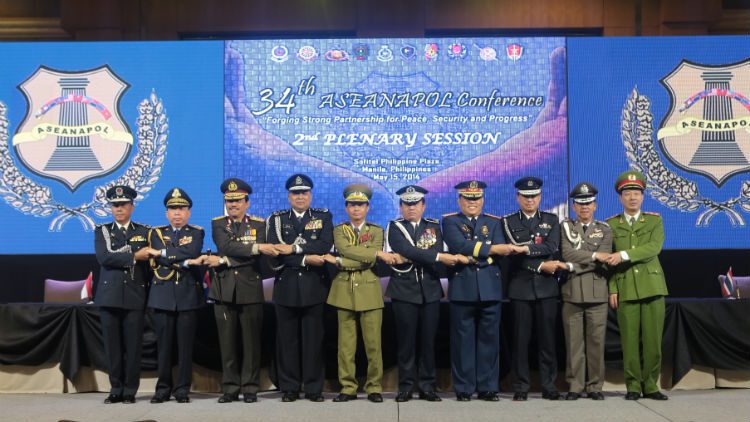SUMMARY
This is AI generated summarization, which may have errors. For context, always refer to the full article.

MANILA, Philippines – As political and economic leaders in the Association of Southeast Asian Nations (ASEAN) prepare for the planned 2015 regional integration, police forces in the region have another target: for Southeast Asia to be free of illegal drugs by next year.
A “drug-free ASEAN” is one of the goals outlined in a joint communiqué issued by members of the ASEAN Association of Chiefs of Police (ASEANAPOL) at the end of their annual conference held in Manila from May 12 to 16, 2014.
Speaking at the closing ceremonies of the 34th ASEANAPOL Conference on Thursday, May 15, Philippine National Police (PNP) chief Director General Alan Purisima said member-countries and ASEANAPOL partners adopted a “Joint Response to Crisis situations, and to address transnational criminal threats in Southeast Asia” at the end of the annual meet.
ASEANAPOL members agreed to improve their existing Electronic ASEANAPOL Database System, or e-ADS, where intelligence reports are exchanged between agencies.
Aside from drug trafficking, ASEANAPOL members will also focus on terrorism and human trafficking.
“Just as technology is fast advancing, criminals and terrorists are keeping pace as well. We have seen the emergence of cybercrimes in our respective countries,” said Purisima.
International meets like ASEANAPOL are particularly important for investigators, said one PNP official. “It makes things easier when we crack down on transnational crimes because you don’t need to go through diplomatic channels. There’s an understanding between police forces,” he said.
The police forces of the 10 ASEAN members form the ASEANAPOL. Dialogue partners include Australia, China, Japan, South Korea, New Zealand, International Criminal Police Organization (Interpol), the ASEAN Deputy Secretary General, the ASEANAPOL Secretariat and its newest member, observer Russia.
Anti-terrorism, maritime crime
One of the deals forged during the meet was a tripartite agreement between Indonesia, Malaysia and the Philippines. (READ: Issues on ASEAN integration)
The trilateral discussion, held during the first day of the 34th ASEANAPOL conference in Manila, solidified an earlier memorandum between the PNP, INP, and Royal Malaysian Police Force (RMP) signed on May 13, 2002.
The Philippines, Malaysia, and Indonesia share a tri-border corridor in the Sulu-Sulawesi sea. Based on the agreement, the 3 countries must each set up an organization that will act as a communication hub.
“With technology, we can solve this problem. But we have limited resources. We cannot flight the criminals without information from other countries,” Alius added.
In a May 15 statement from the PNP, Tan Sri Dig Dato’ Sri Khalid Bin Abu Bakar of the RMP said the deal would allow Malaysia and the Philippines to exchange intelligence information and establish a communication system that would help prevent cross-border crimes. It would also make response faster if they happen.
Cross-border kidnappings have become more common, with lawless elements from the Philippines nabbing tourists from nearby Malaysian dive resorts. Recently, a Chinese national and a Filipino were kidnapped from a resort in Malaysia and allegedly whisked off to Sulu in Mindanao, the Philippines.
Prevention is also key to ASEANAPOL’s strategies in curbing terrorism in the region. “The ASEANAPOL called on all its members to reinforce cooperation in preventing and suppressing terrorist activities by implementing strategies in the detection, deterrence, rehabilitation, reorientation, counter-radicalization, de-radicalization and community engagement,” the group said in the joint communiqué.
Member counties are also “encouraged” to set up detention centers for suspected terrorists and other prisoners to “prevent them from spreading radical ideas in accordance with laws and policies of their respective countries.”
“The problem is quite the same in the Philippines, Indonesia and Malaysia… the problem is ideology [and] it’s not easy to handle this,” said Alius.
Indonesia will host the next ASEANAPOL conference in 2015. – Rappler.com
Add a comment
How does this make you feel?
There are no comments yet. Add your comment to start the conversation.